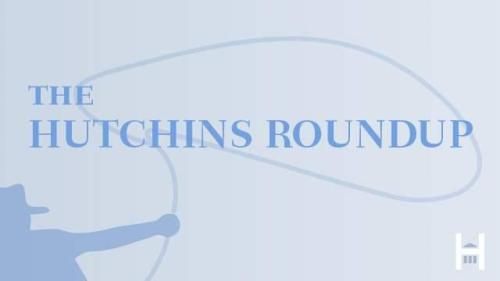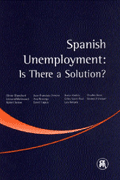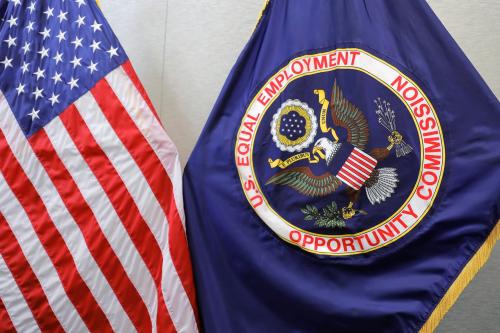Studies in this week’s Hutchins Roundup find that the number of people in the gig economy is smaller than previously believed, negative interest rate increases bank loan rates, and more.
Want to receive the Hutchins Roundup as an email? Sign up here to get it in your inbox every Thursday.
The gig economy is smaller than previously believed
Lawrence Katz of Harvard University and Alan Krueger of Princeton University find that there are fewer people in the gig economy than previously thought. A 2015 RAND-Princeton survey, designed by the authors because the Bureau of Labor Statistics didn’t have funding to repeat previous surveys, found that the number of workers with alternative work arrangements rose from 10.7 percent of all workers in 2005 to 15.8 percent in 2015. But a recent BLS survey suggests that the fraction of workers in the gig economy was only 10.1 percent in 2017, a bit lower than it was in 2005. The authors explain that the relatively high level of unemployment in 2015 may have led more people to take gig jobs. But they also think that their 2015 estimate of the gig economy was too high because of flaws in the survey.
Negative interest rates may be contractionary
Between 2012 and 2016, some central banks reduced their policy rates below zero to combat the sluggish recovery from the Great Recession. But while the negative policy rate is now part of the central bank toolbox, its simulative effects remain debatable. Using Swedish bank-level data Gauti Eggertsson of Brown University and coauthors find that a policy rate of -0.5 percent actually increases the interest rate on bank loans rates by 0.15 percentage points and reduces output by 0.07 percentage points. The authors reason that banks are unwilling to pass the negative interest rates on to depositors and thus suffer lower profits which, in turn, makes them less willing to lend. The authors find that Swedish banks that relied more heavily on customer deposits cut back on lending relative to other banks once the policy rate fell below zero. In the short term, a negative policy rate is at best irrelevant, the authors say, but could potentially be contractionary because of the negative effect on bank profits.
Extending unemployment insurance helps consumers more than raising benefit level
How does consumer spending evolve during an unemployment spell? Using account-level data from checking and credit card accounts, Peter Ganong and Pascal Noel of the University of Chicago find that an unemployed worker’s consumption falls by 6 percent before unemployment insurance payments begin, by an additional 1 percent per month while receiving unemployment insurance, and by a further 12 percent when unemployment insurance is exhausted. The sensitivity of spending to the predictable loss of unemployment insurance benefits suggests that households do not smooth consumption, either because they are not forward looking or because they are biased toward current consumption, the authors say. They conclude that unemployed workers would derive higher welfare from an extension of unemployment insurance than from an increase in the level of benefits.
Chart of the week: Average tariff that the United States levies on imports from other countries more than doubled in 2018

Quote of the week:
“High public debt is bad, but may not be catastrophic. It’s not as if I want more debt, but if there is more debt, it’s not the end of the world. You don’t want to do it for nothing, for no reason, but if you have good things to do with it, whether it’s public investment, whether it is propping up output during a recession or when interest rate is at the zero lower bound, [governments] should do it,” says Olivier Blanchard of the Peterson Institute for International Economics in his presidential address at the American Economic Association. “The benefits are likely to exceed the cost of debt. More relevant for countries like Italy than the U.S. at this point, if you are worried about the bad equilibrium, the notion that you’re getting to a high [interest rate] because of a risk of default, fiscal austerity is not the way to go, you have to think about other approaches. What do I want you to go away with? Not the notion that debt is good, but debt may not be so bad”
Ever wondered if you could do a better job managing the federal budget than our elected representatives? Play The Fiscal Ship and find out!
The Brookings Institution is committed to quality, independence, and impact.
We are supported by a diverse array of funders. In line with our values and policies, each Brookings publication represents the sole views of its author(s).










Commentary
Hutchins Roundup: Size of the gig economy, negative interest rates, and more
January 10, 2019
Studies in this week’s Hutchins Roundup find that the number of people in the gig economy is smaller than previously believed, negative interest rate increases bank loan rates, and more.